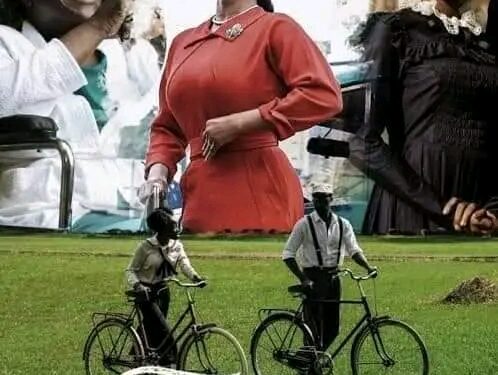Funmilayo Ransom-Kuti premiered on Prime on June 21st, and I was thrilled beyond words. At last, a biopic dedicated to the extraordinary Funmilayo Ransom-Kuti! We all remember her from secondary school as the first woman to drive a car in Nigeria. But that’s such a minor part of her story. Funmilayo Ransom-Kuti’s legacy is vast and profound, deserving of more than just a footnote in our history and government textbooks.

This film, brought to us by the remarkable Bolanle Austen-Peters, is one I could watch over and over. Let me walk you through why it stands out.
A Bold Move in Nollywood
In an industry where filmmakers often shy away from biopics, Bolanle Austen-Peters took a courageous step. She chose to tell the story of a monumental figure in Nigerian history and did it justice. This biopic isn’t just about Funmilayo Ransom-Kuti being Fela Kuti’s mother or the first Nigerian woman to drive a car. It delves deeply into her life, highlighting her as a pivotal figure in women’s rights and Nigerian history.

The Women’s Revolt of 1947
The film centers on the lesser-known but highly significant women’s revolt of 1947. As the leader of the Abeokuta Women’s Union, Funmilayo Ransom-Kuti, alongside Eniola Soyinka (Wole Soyinka’s mother), led the Ẹ̀gbá women in a protest against high taxes and gender discrimination. Their efforts resulted in the abdication of the Aláké of Ẹ̀gbá Land, the end of taxation on women, and the inclusion of women on the local council. This earned her the title “The Lioness of Lisabi.”

The film doesn’t stop at the protest. It also covers her journey as the first female student at Abeokuta Grammar School and her advocacy for women’s and children’s education. This broad narrative ensures that Funmilayo’s character isn’t reduced to a single story but is portrayed in all her complexity and strength.

Engaging Plot and Characters
The story unfolds by portraying Funmilayo Ransom-Kuti at three stages of her life: as a young girl (Iyimide Ayo-Olumoko), a young woman (Kehinde Bankole), and an older woman (Joke Silva). Each actor brings a unique and powerful performance, making each stage of her life compelling.
The story begins dramatically with the 1977 invasion of Fela Kuti’s home, the Kalakuta Republic, by Nigerian Army. They throw the elderly Funmilayo, played by Joke Silva, from a balcony, causing an injury that would lead to her death a year later. This scene was particularly gripping as it vividly captured the chaos described in historical accounts.

From Childhood to Adulthood
The narrative seamlessly intertwines Funmilayo’s life events, from her childhood as Frances Thomas to her time in London, where she adopted her Yoruba name, Funmilayo. Her resilience is evident as she becomes the first female student at Abeokuta Grammar School and develops a strong bond with Israel Ransom-Kuti.
Israel and Funmilayo’s relationship, rekindled after their respective educations abroad, leads to marriage and a family. Despite their elite status, Funmilayo’s passion for education and social justice never wanes.

The Market Women’s Hero
Funmilayo’s life changes when she meets Iya Supo, a market woman whose son had stopped attending school due to high taxes. Funmilayo’s confrontation with the tax collectors at the market and her subsequent formation of the Abeokuta Women’s Club mark the beginning of her fight against injustice. Her bravery and leadership during this period are truly inspiring.
The set design and costumes perfectly capture the era, illustrating the stark class divide between those who received a Western education and those who stayed behind in Abeokuta. Funmilayo’s efforts to bridge this divide are a testament to her dedication to social justice.

The Major Flaw
However, the film isn’t without its flaws. The infiltration of English in scenes where Yoruba would have been more authentic was jarring. Characters who should have continued speaking Yoruba, like the head of the Parakoyi and certain guards, instead spoke impeccable English. This inconsistency detracted from the film’s authenticity. In a period piece like this, maintaining linguistic accuracy is crucial for immersion, and this was a noticeable misstep.

Stellar Cast Performances
The cast performances are a standout. Iyimide Ayo-Olumoko, Kehinde Bankole, and Joke Silva each embody Funmilayo Ransom-Kuti’s spirit at different stages of her life. Iyimide’s portrayal of young Funmilayo is vibrant and fearless, capturing the early signs of her indomitable spirit. Kehinde Bankole shines as the young adult Funmilayo, reflecting her growing political activism and leadership. Joke Silva, as the older Funmilayo, brings wisdom and resilience to the role, beautifully portraying a woman who has achieved and endured so much.
Ibrahim Suleiman’s portrayal of Israel Ransom-Kuti also deserves mention. His character’s support for Funmilayo highlights the importance of having a partner who appreciates and encourages your strength.

Final Thoughts
Despite its flaws, Funmilayo Ransom-Kuti is a beautifully executed film. Bolanle Austen-Peters has created a compelling and inspiring portrayal of a woman who played a pivotal role in Nigerian history.
The film’s focus on a specific part of her life allows for a detailed and powerful narrative. I give this movie a solid 8/10. It’s a fine example of what Nollywood can achieve, and I look forward to Austen-Peters’ upcoming film, House of Gà.
Let’s hope for more such beautiful representations of our heroes in Nollywood. This movie has certainly set a high standard, and I can’t wait to see what comes next.

















